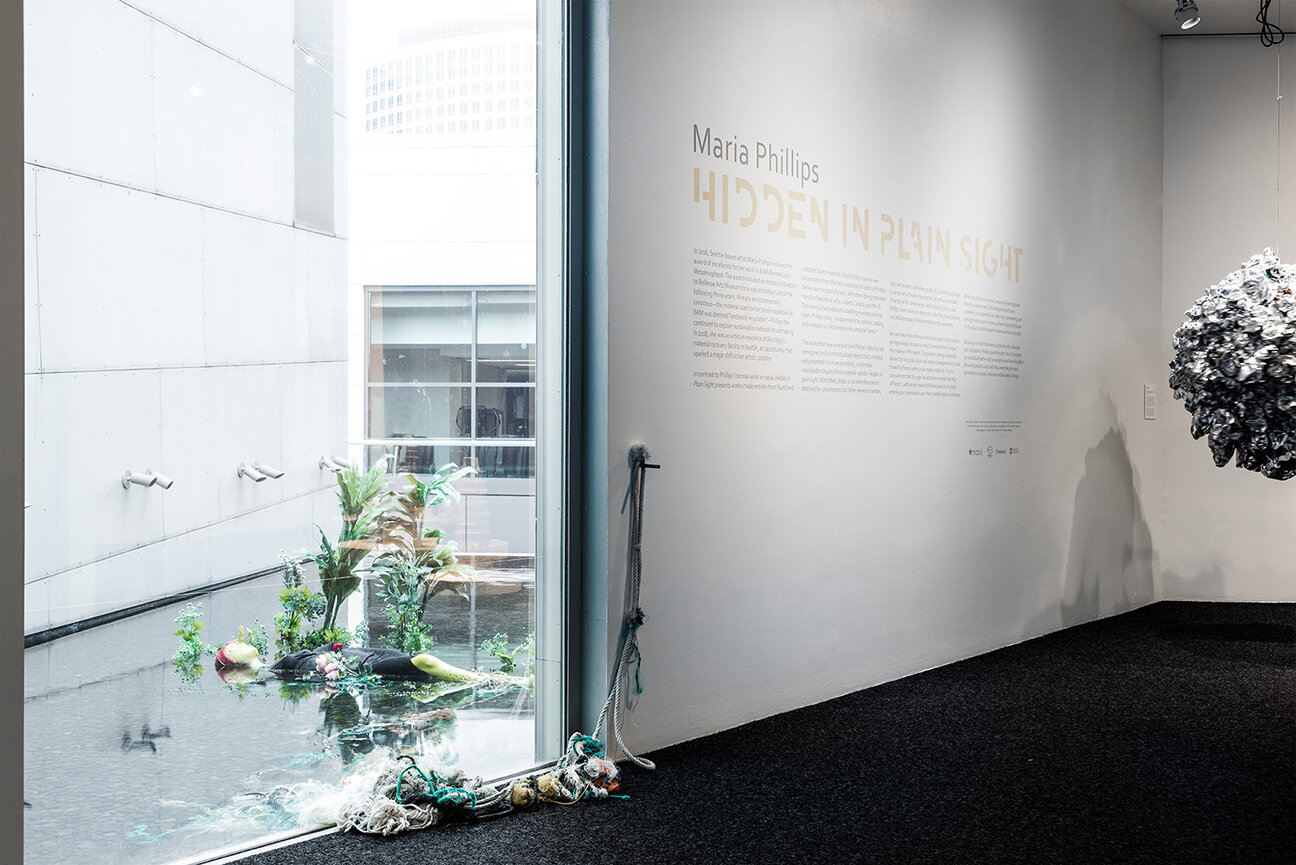
Hidden in Plain Sight 2019/20
In 2016, Seattle-based artist Maria Phillips received the award of excellence for her work in BAM Biennial 2016: Metalmorphosis. The award included an invitation to return to Bellevue Arts Museum for a solo exhibition within the following three years. Already environmentally conscious—the material used for her 2016 installation at BAM was deemed “endlessly recyclable”—Phillips has continued to explore sustainable methods for artmaking. In 2018, she was an artist in residence at Recology’s material recovery facility in Seattle, an opportunity that sparked a major shift in her artistic practice.
In contrast to Phillips’ biennial work in metal, Hidden in Plain Sight presents works made entirely from found and collected plastic materials. Much of this material was accumulated from the daily consumption habits of Phillips’ family over the span of a year, with others being recovered from the beaches of India, Iceland, Canada, and the US. This exercise has produced a startling inventory and has been, Phillips notes, “an opportunity to consider, catalog, and evaluate our relationship with consumer items.”
The works that have emerged from Phillips’ collection are reimagined and re-contextualized objects that, installed and presented in a museum setting, confirm the inescapable ubiquity of one material—plastic—hidden in plain sight. Most often, plastic is not even the product destined for consumption, but rather serves to contain, seal, and protect consumer goods. It is a vehicle, a badge in our society of mass-consumption, as well as a reminder of our thirst for convenience. Both a blessing and a curse. Phillip’s work draws our attention to the fate, sheer quantity, and initial purpose of these primarily single-use items.
We now live in the Anthropocene (name given to the current geological age), an epoch in which humans directly impact the makeup of the earth. The planet is being noticeably altered by the production and waste-management (or lack thereof) of long-lasting man-made materials. It is no coincidence that this age has also been named the 'Age of Plastic', with an estimated 18 billion pounds of plastic entering our oceans each year from coastal regions and rivers.
While recycling is our primary means of diverting plastic from the waste stream, this enterprise itself poses problems; it is dependent on collecting, transporting, and sorting materials and carries a carbon footprint of its own. To this day, it is cheaper to make new than to recycle.
By luring us in with the beauty of this peculiar collection and installation, Phillips opens the door for us to consider our individual patterns of consumption and how they affect the world around us all, each day, every day, for many generations to come, unless we initiate radical change.

Technosphere + Feedback Cycle
Technosphere: Single-serving chip bags, Capri Sun juice pouches, family-size chip bags, coffee bags, Emergen-C packets, steel wire, motor
Feedback Cycle: Series of neckpieces made from plastics collected from various beaches around the globe.
Mounts: Marine debris collected in Hawaii

Technosphere 2019
Single-serving chip bags, Capri Sun juice pouches, family-size chip bags, coffee bags, steel wire, motor
3.5’ x 4’
It is nearly impossible to recycle snack bags such as these—comprised of multiple layers of material, usually foil and plastic—with the current technology at our disposal. Throughout the summer months, numerous kids attend camps and, in most cases, bring their own lunch. While visiting my son’s camp this summer, I discovered hundreds of these snack bags were being thrown away each day. This was just one of a thousand camps taking place in Seattle alone, not to mention across the country and the world. Every year 12 billion tons of flexible plastic packaging ends up in landfills.
Technofossil is the name given by scientists to denote the remains of man-made objects and construction since we as a species have started manufacturing long-lasting artifacts, including modern-day technology (computers, smartphones, and other electronic devices) that will still be found millions of years into the future embedded in the planet’s strata.
Technosphere rotates in the same direction as the earth, evoking a planet collapsing under the weight of human impact.

Technosphere 2019
Detail: Single-serving chip bags, Capri Sun juice pouches, family-size chip bags, coffee bags, Emergen-C packets, steel wire, motor
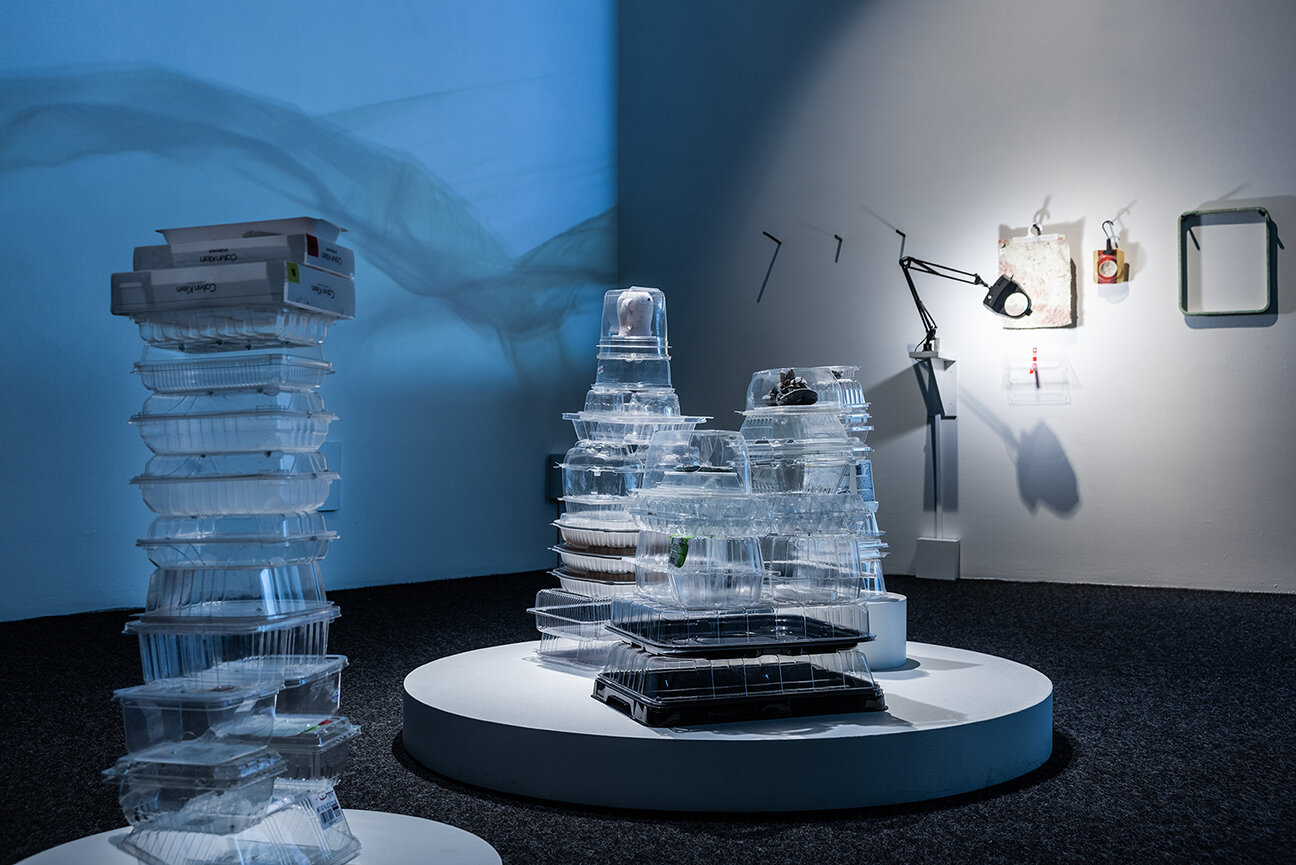
Future Relics 2019
Installation view.
Video background: Horrific Beauty
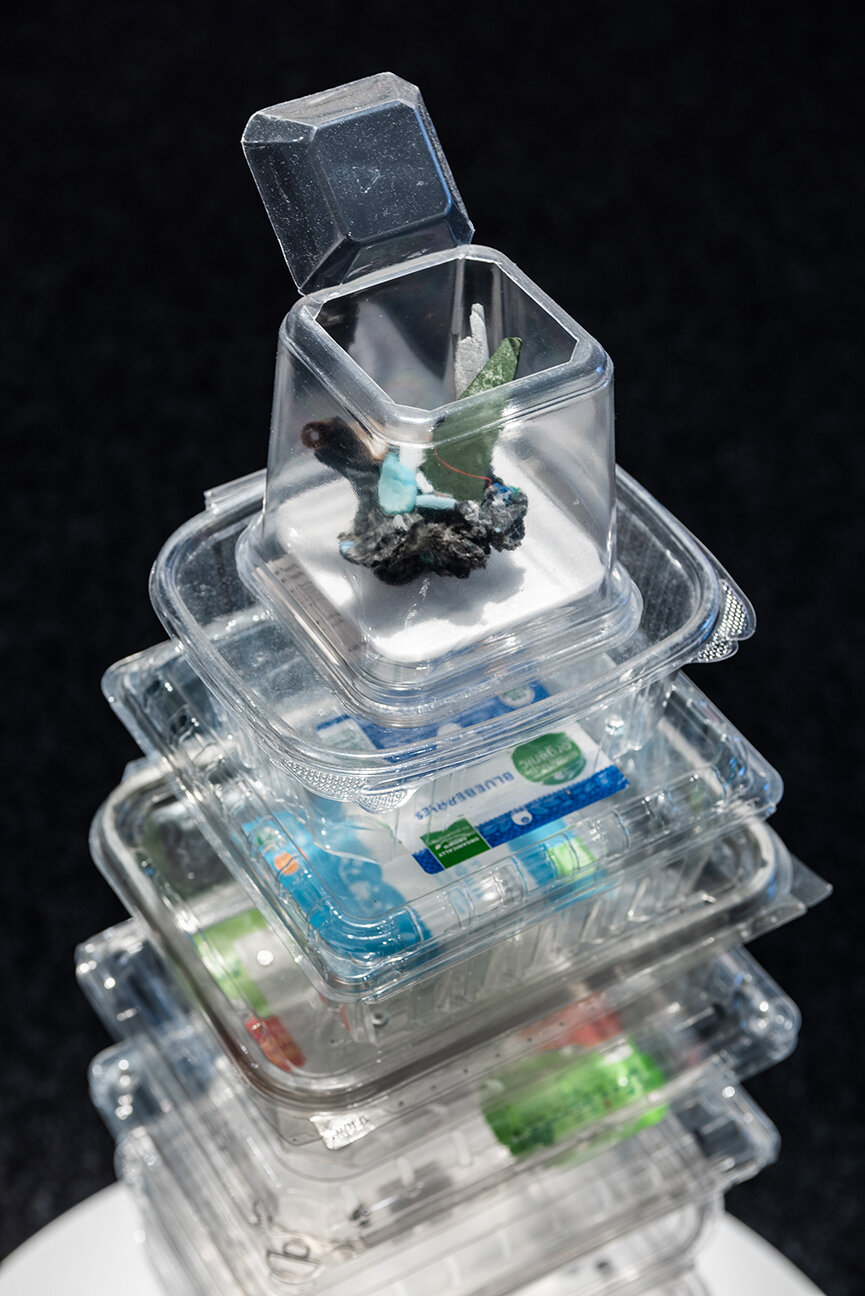
Future Relic #4
Volcanic rock with fused plastic pieces Found on Papakōlea Beach, HI
Pedestal: Single use plastic food containers
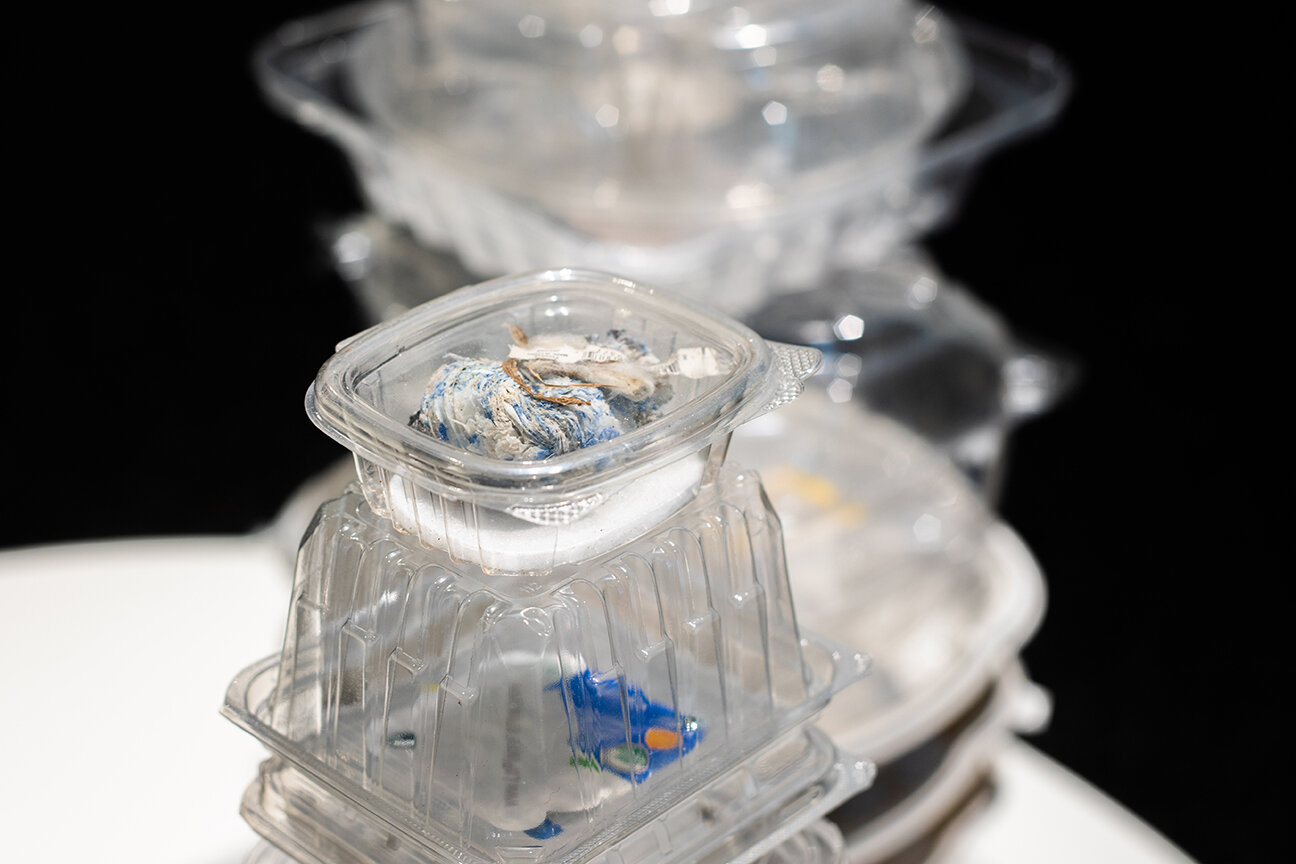
Future Relic #1
Melted tape wad, cigarette filter, label Found on Alki Beach, Seattle, WA
Pedestal: Single use plastic food containers
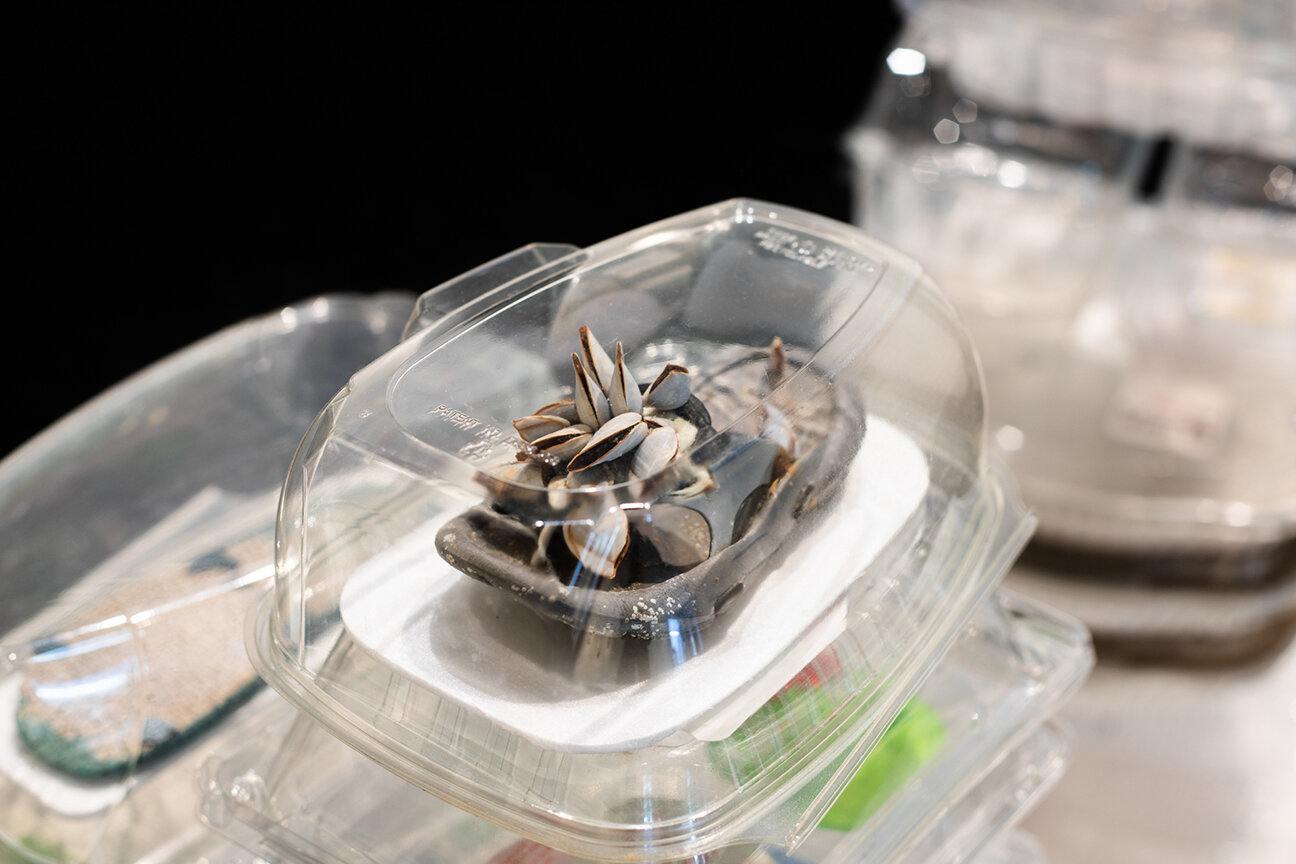
Future Relic #9, 10
Gray sandal with barnacles Found in Surfside, FL (2007)
Blue sandal Found in Nantucket, MA (2007)
Pedestal: Single use plastic food containers

Future Relics 2019
Left to right:
Future Relic #11 Rag with marine algae, plastic hanger Found in Surfside, FL
Future Relic #12 Plastic lid with coral, Oscar Meyer bologna container, hanger Found 2019: Papakōlea Beach, HI and Surfside, FL
Future Relic #13 Found plastic Found 2019: Papakōlea Beach, HI
Future Relic #14 Dryer sheet, marine algae, plastic container Found 2019: Surfside, FL
Second-hand magnifying lamp
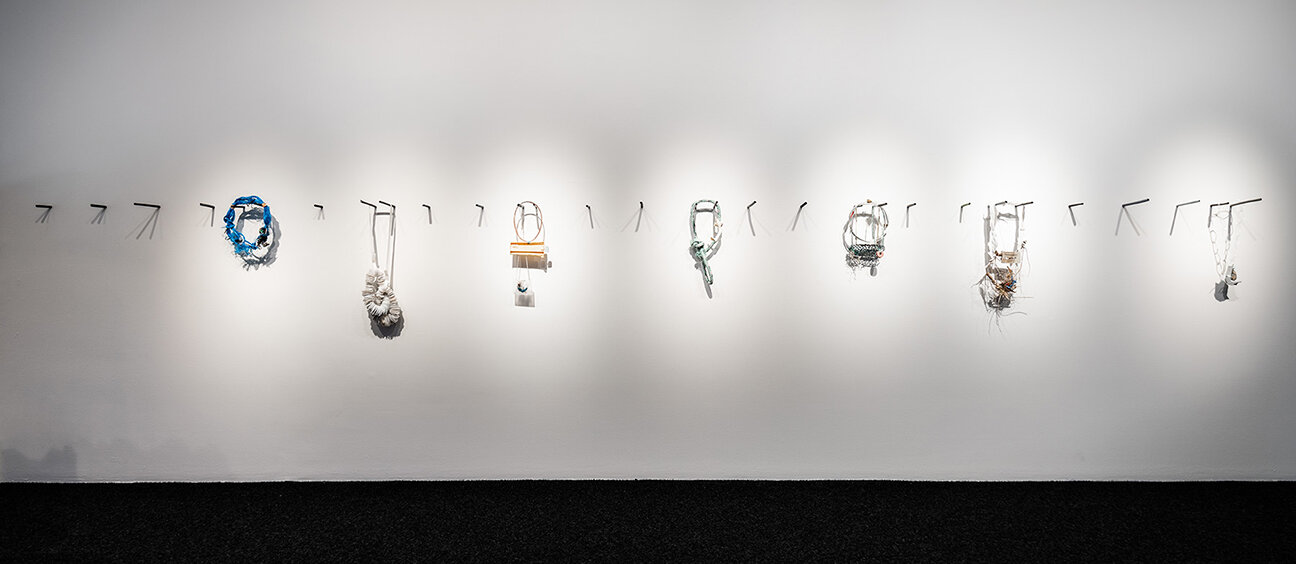
Feedback Cycle: Reinforcing Loop 2019
A feedback cycle is a cyclic structure of cause and effect. An initial change to a given ecosystem causes a series of secondary effects, which in a loop, influence the initial change. All subsequent ecosystems are cyclically affected by these changes. This shift moves the system out of its original state of equilibrium. The descriptive term reinforcing loop refers to changes in the cycle that magnify and reinforce the initial change. The loops tend to destabilize a system, pushing it out of equilibrium and causing fairly drastic overall change. These neckpieces, each a loop, embody both cause and effect and serve as evidence of disruption.
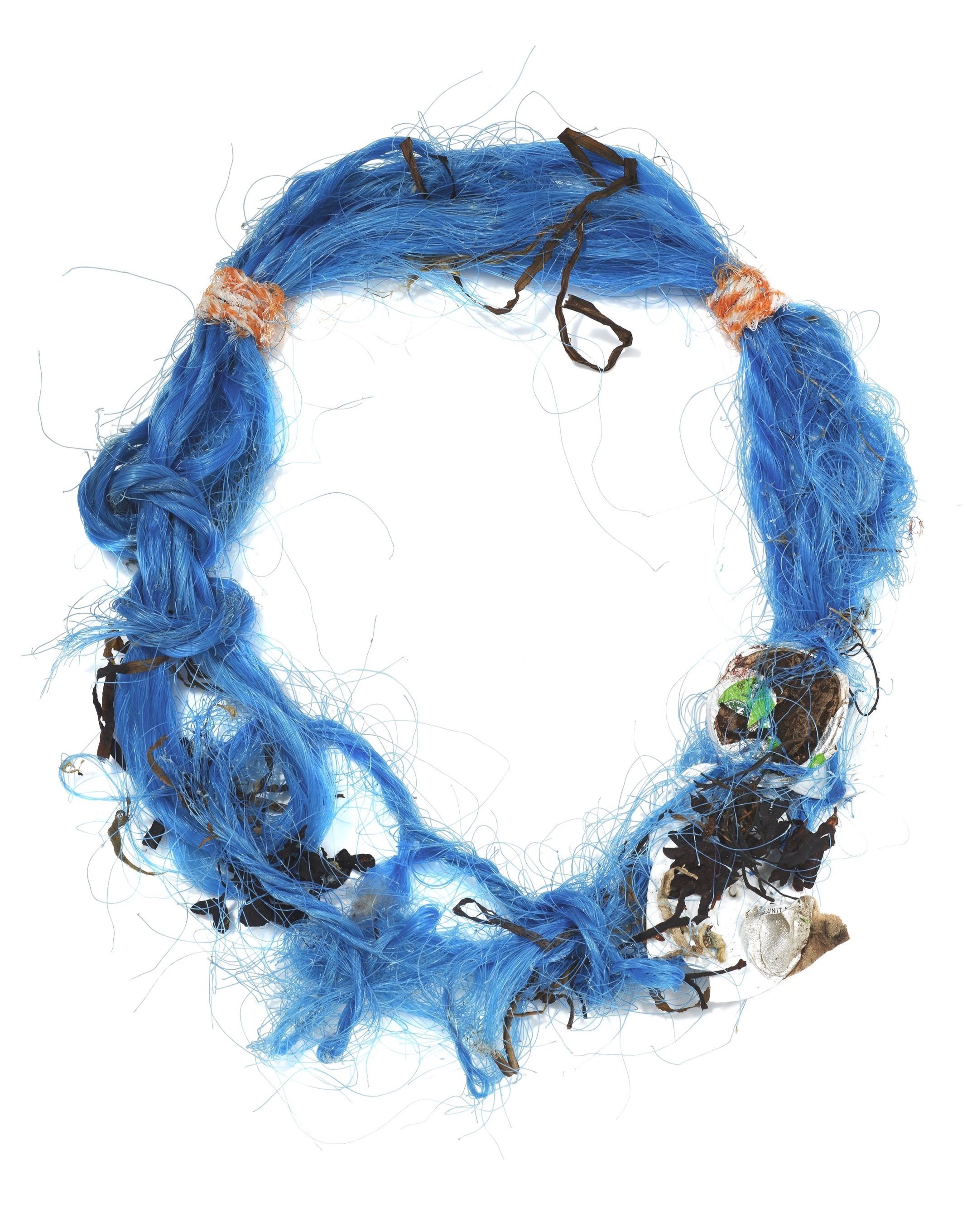
Feedback Cycle – Canada #1
Plastic rope, seaweed, Keurig coffee pods Found on the Gulf Islands, BC
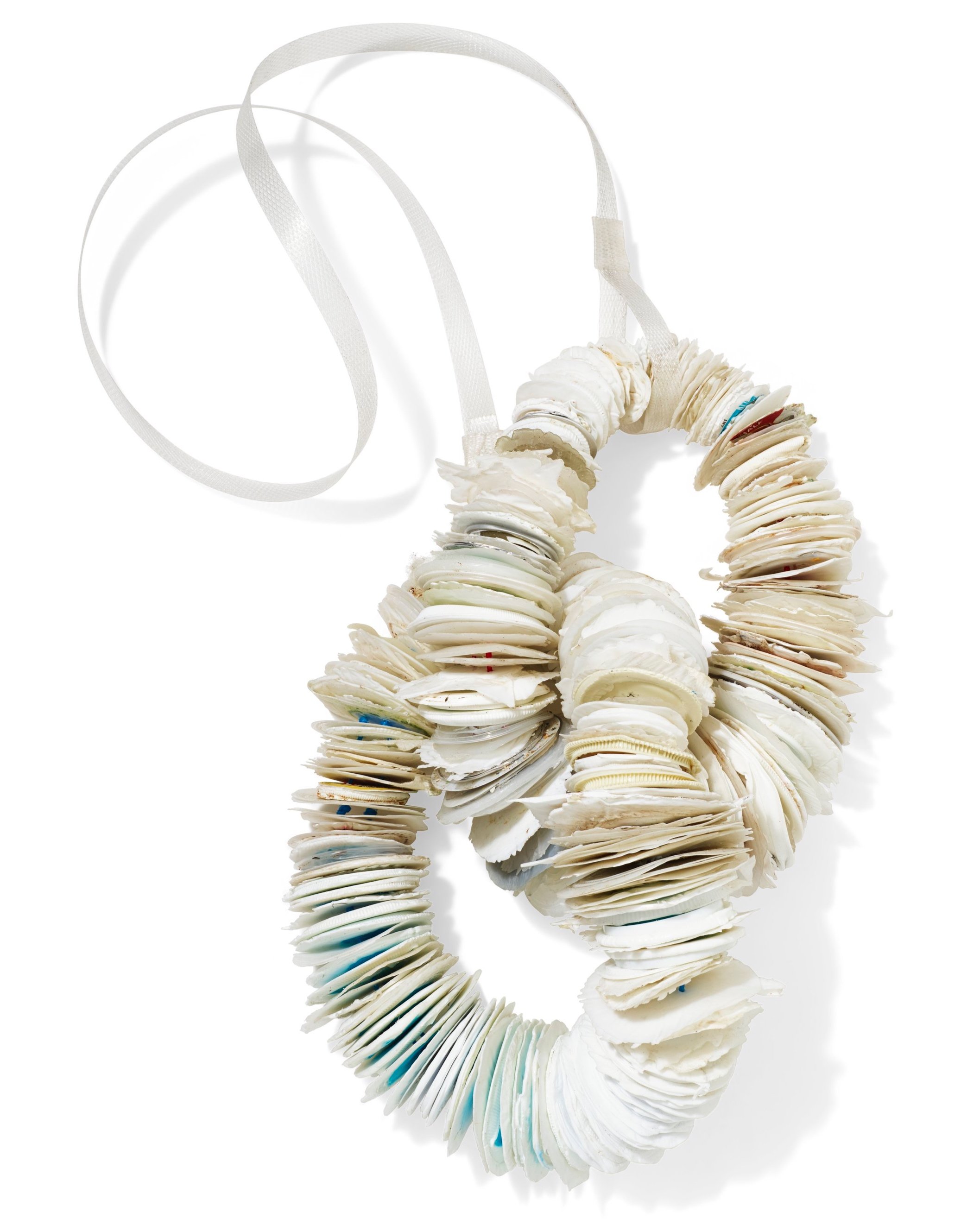
Feedback Cycle – Seattle #2
Plastic bottle caps, bottle rings, package strapping Found in Seattle, WA
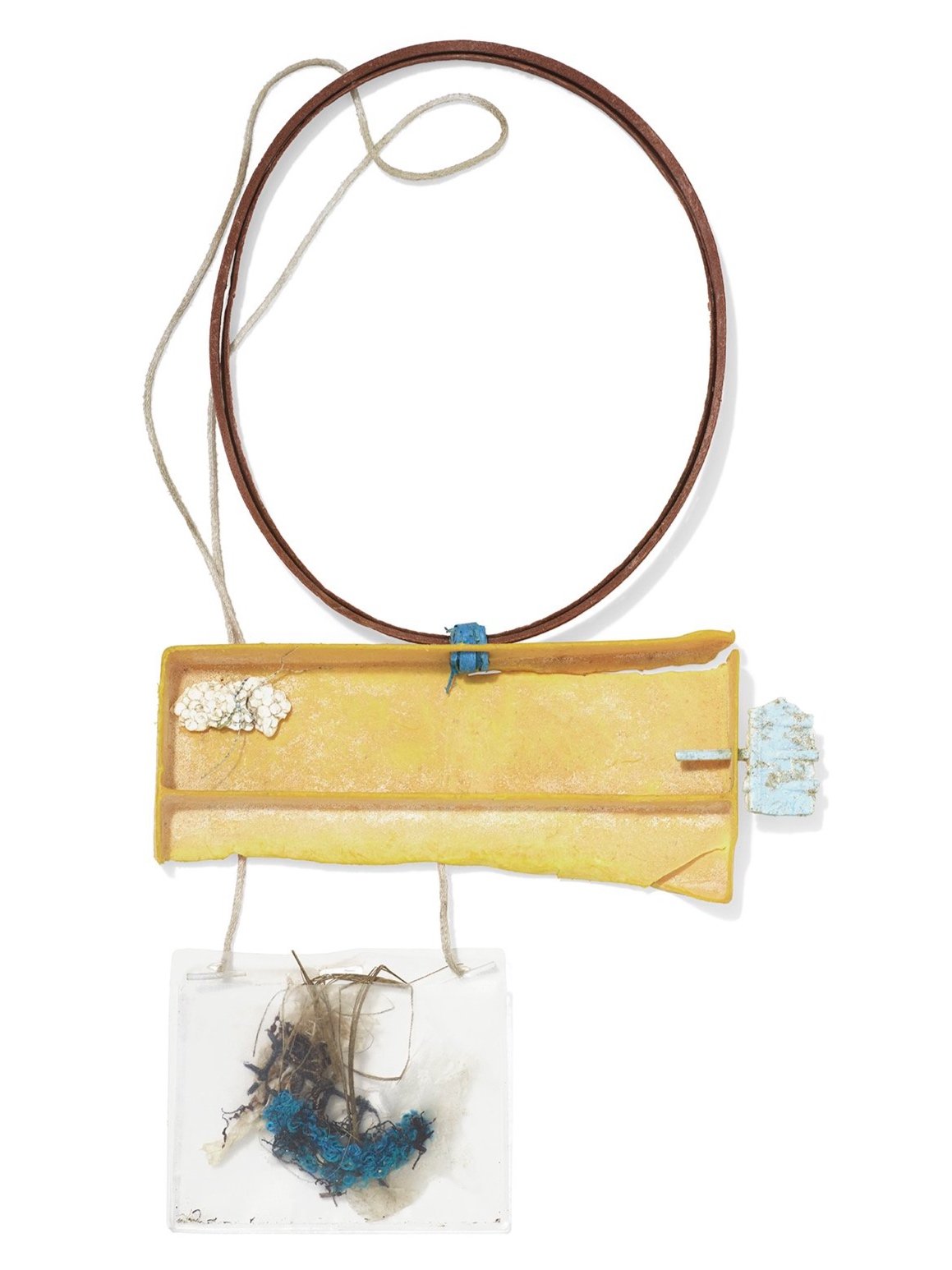
Feedback Cycle – Florida #3
String, plastic, Styrofoam, seaweed Found in Surfside, FL
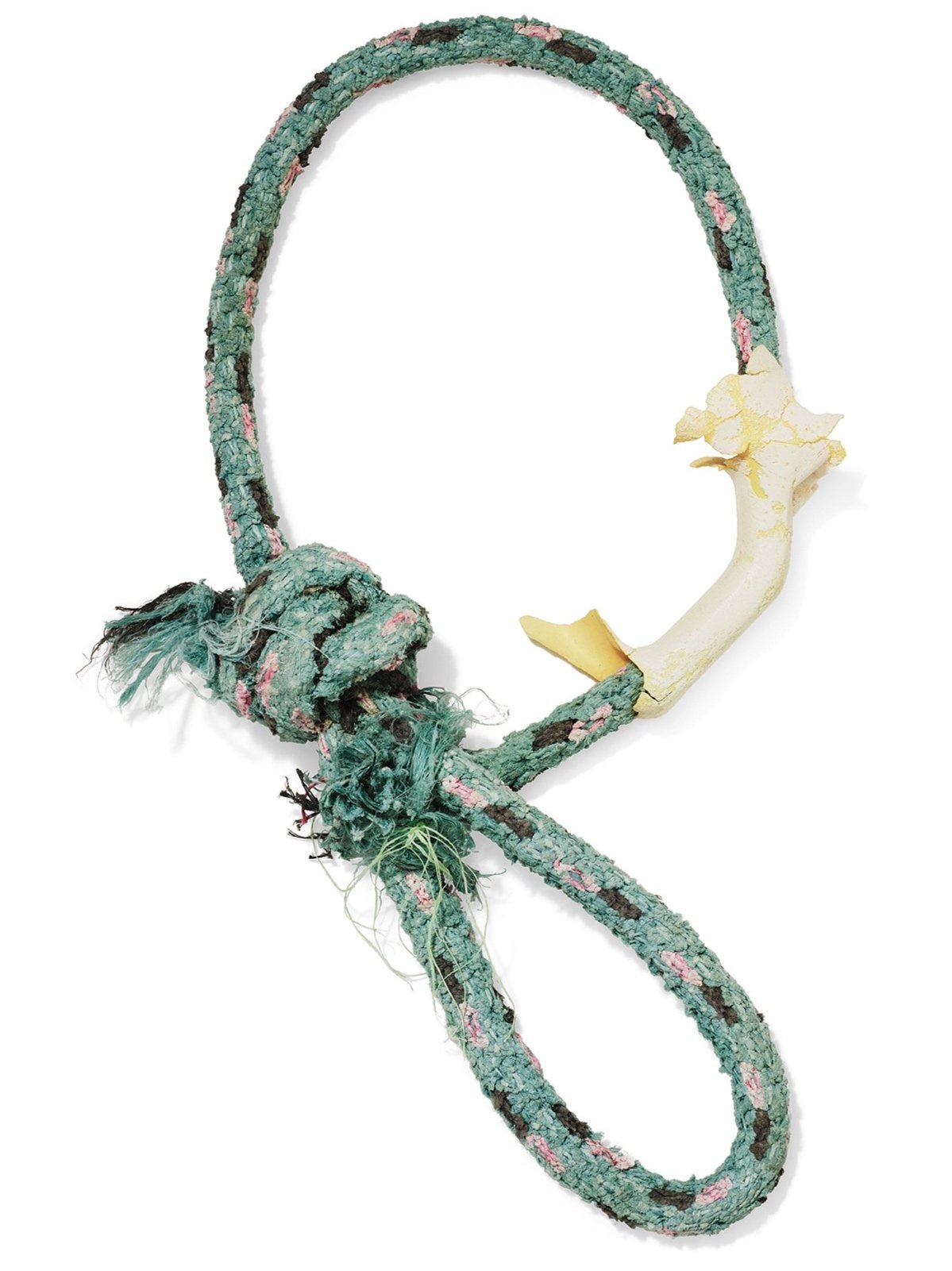
Feedback Cycle – Hawaii #4
Rope and plastic bottle handle Found on Papakōlea Beach, HI
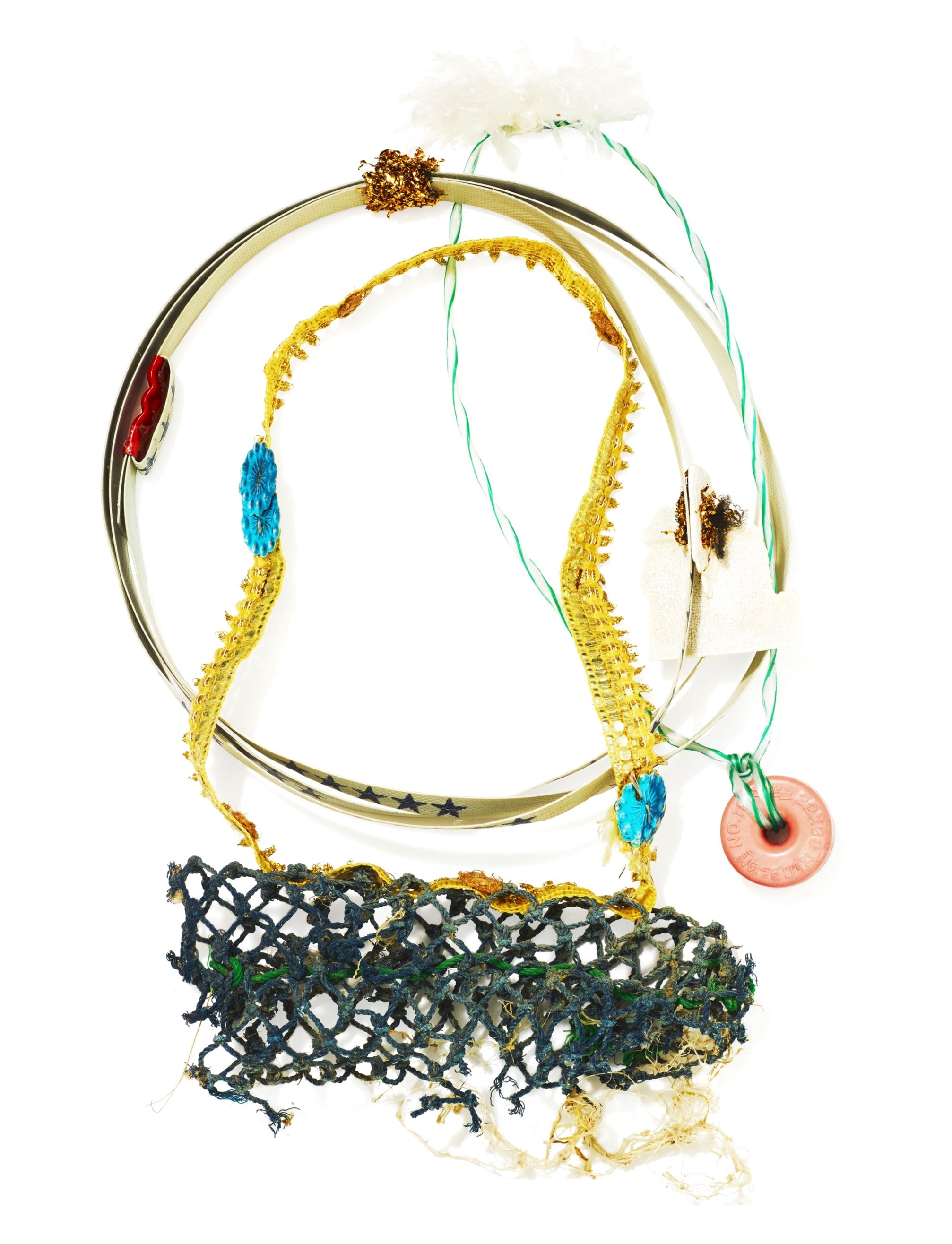
Feedback Cycle – India #5
Strapping, plastic piece, plastic netting, metallic fabric, plastic cord, plastic wheel
Found in Mysore and Tamil Nadu, India
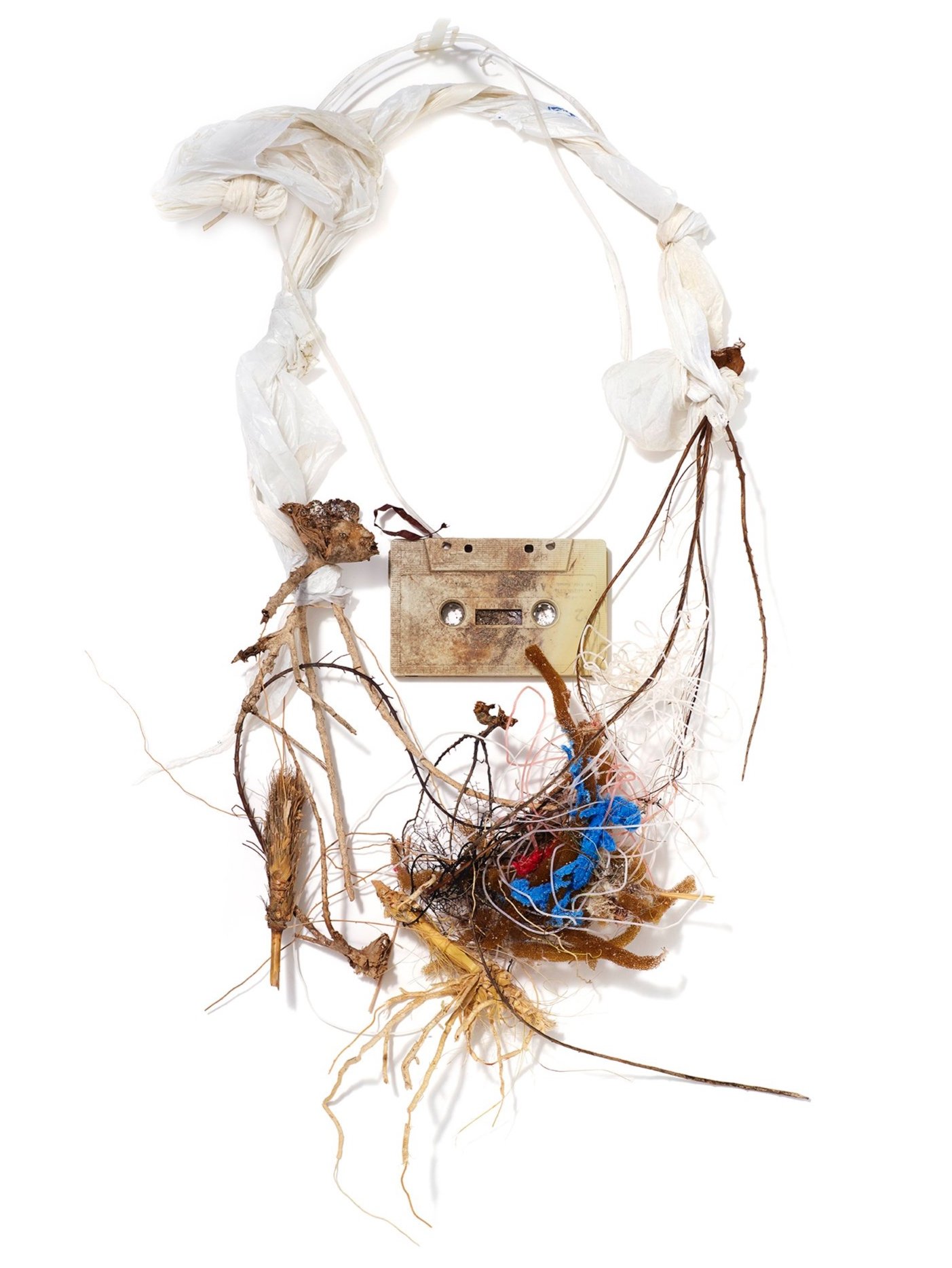
Feedback Cycle – Iceland #6
Plastic bag, sea plants, fabric, thread, found cassette tape Found in Iceland
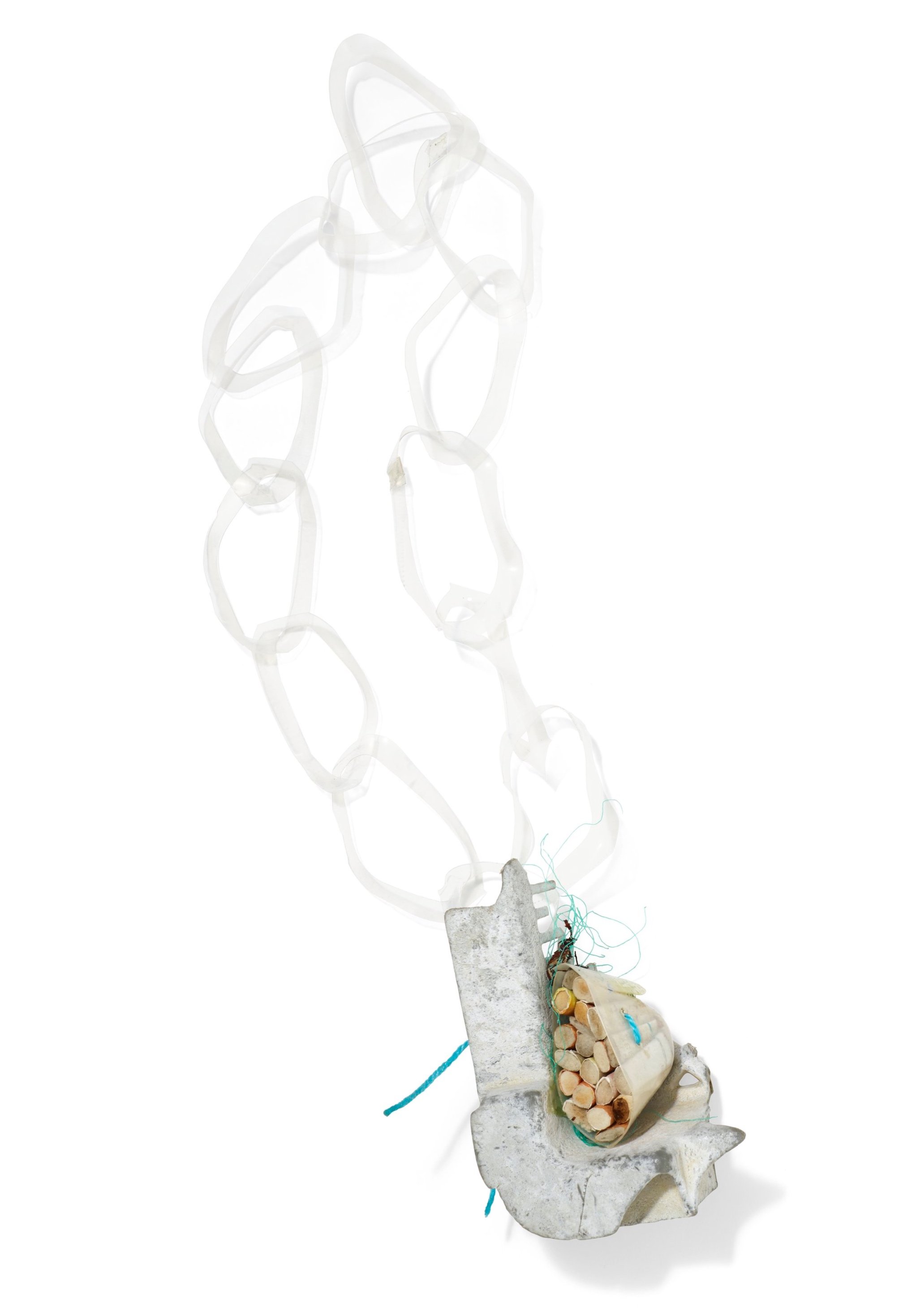
Feedback Cycle - Alki #7
6-pack plastic rings, cigarette butts, plastic Found on Alki Beach, WA
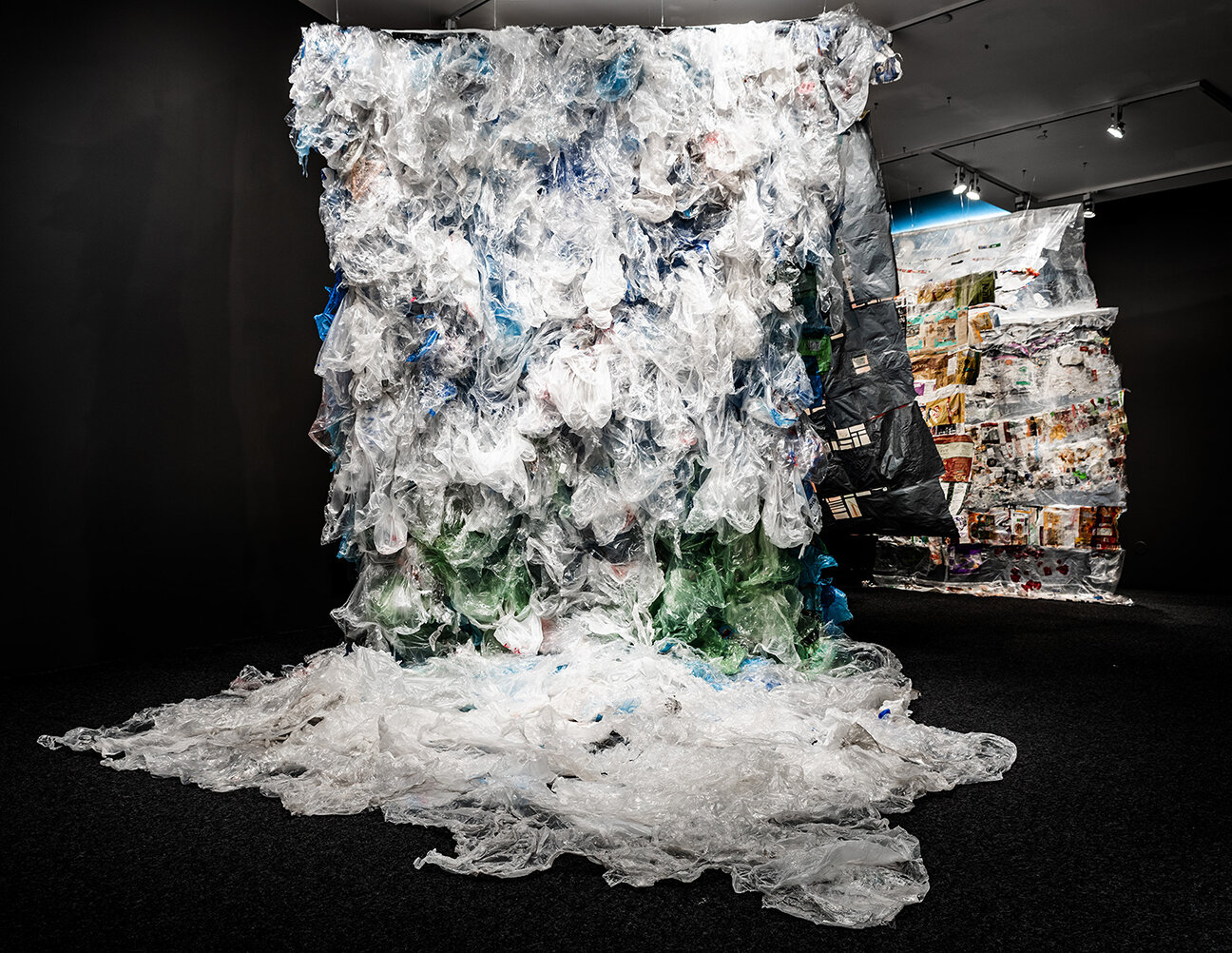
Undercurrent: Plasticene 2019
Filmy plastics, grocery bags, packaging materials, saran wrap, and various non-recyclable plastics collected over the course of a year
25’ x 15’ x 40’
For the past year I have been collecting the non-recyclable plastic material consumed by my family of four. During this time, my awareness of the ubiquitous nature of this material continuously grew, and I felt compelled to collect any and all non-recyclable materials that I could possibly come across. This included items found on the streets, objects encountered at gatherings, festivals, sporting events, even summer camps. My obsession spread to my extended family and friends, who began to bring me their non-recyclable items. This installation shows the scope of this collecting exercise.
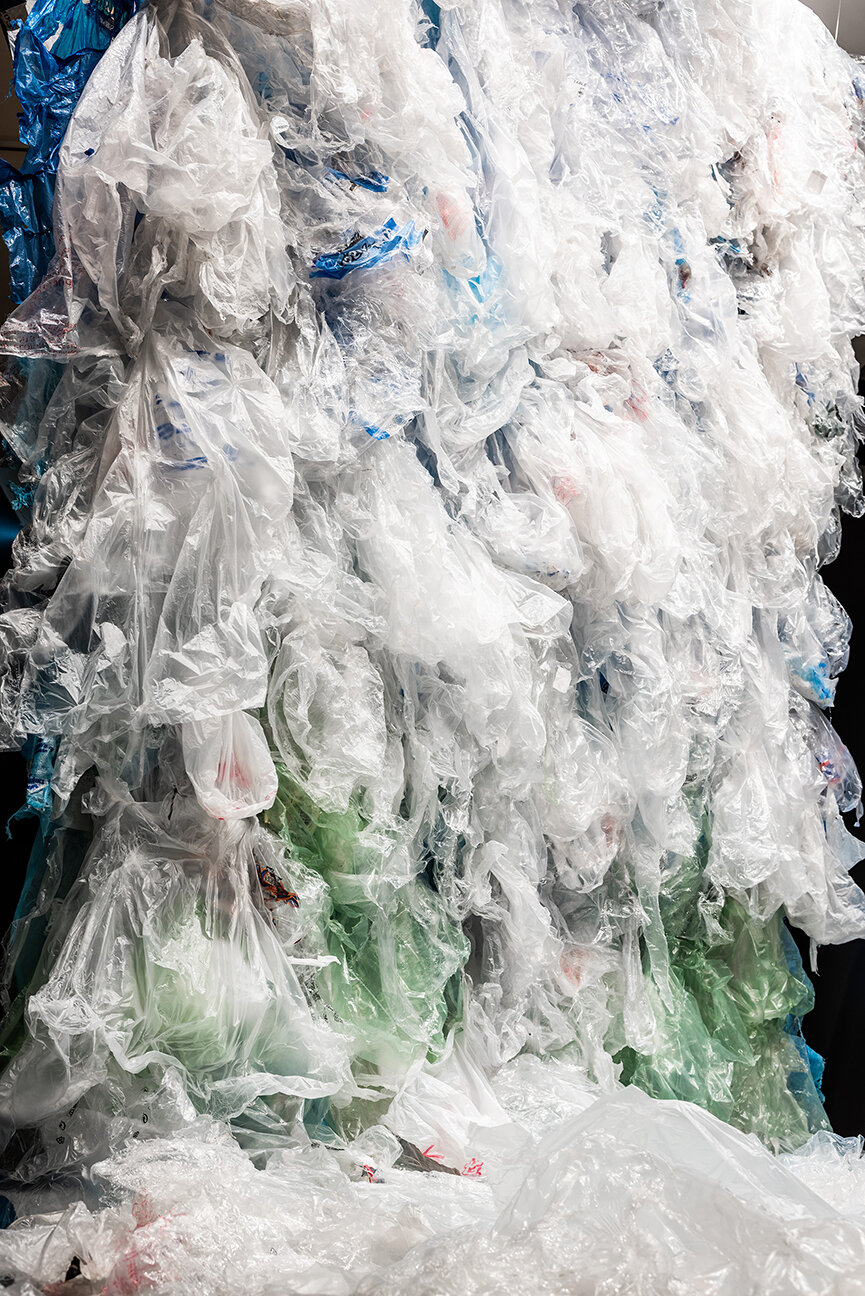
Undercurrent: Plasticene 2019
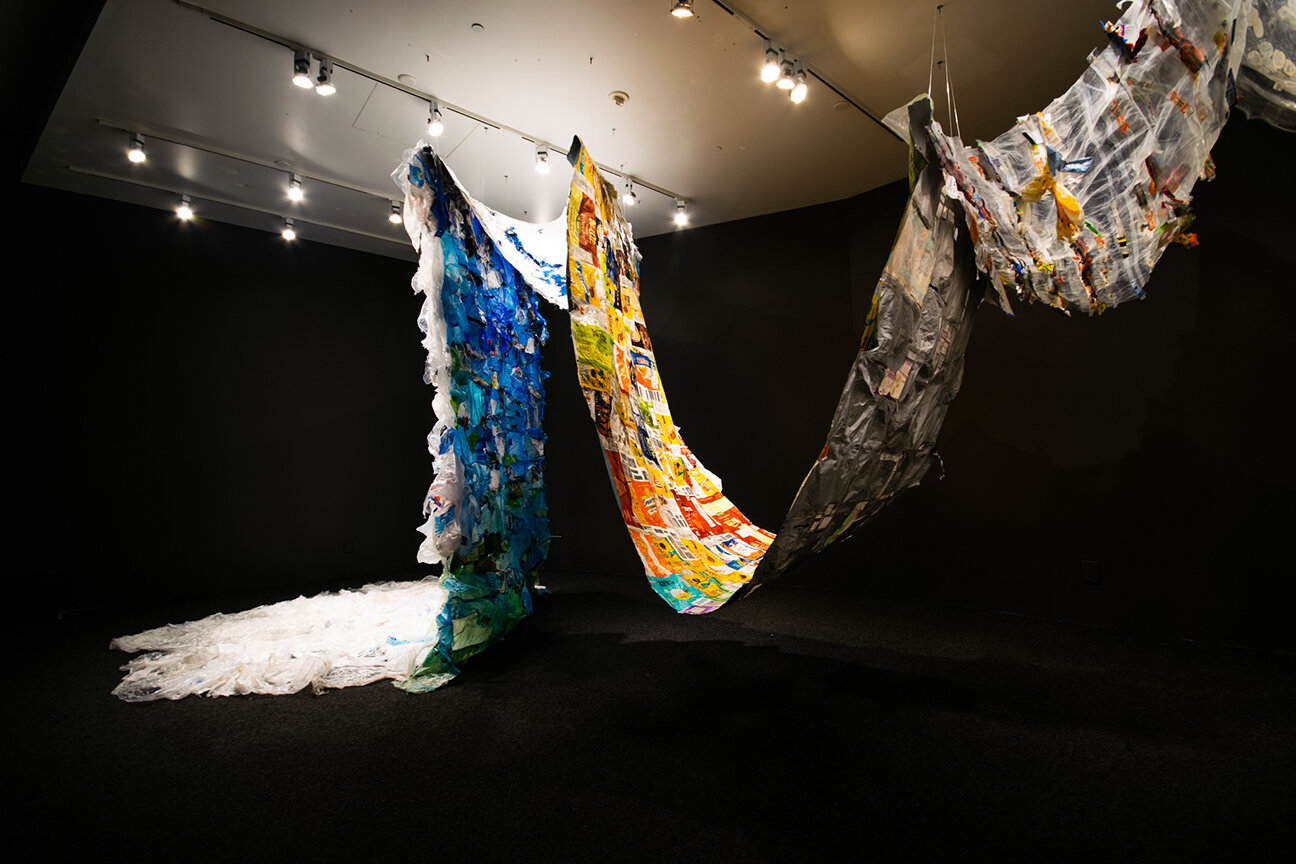
Undercurrent: Plasticene 2019
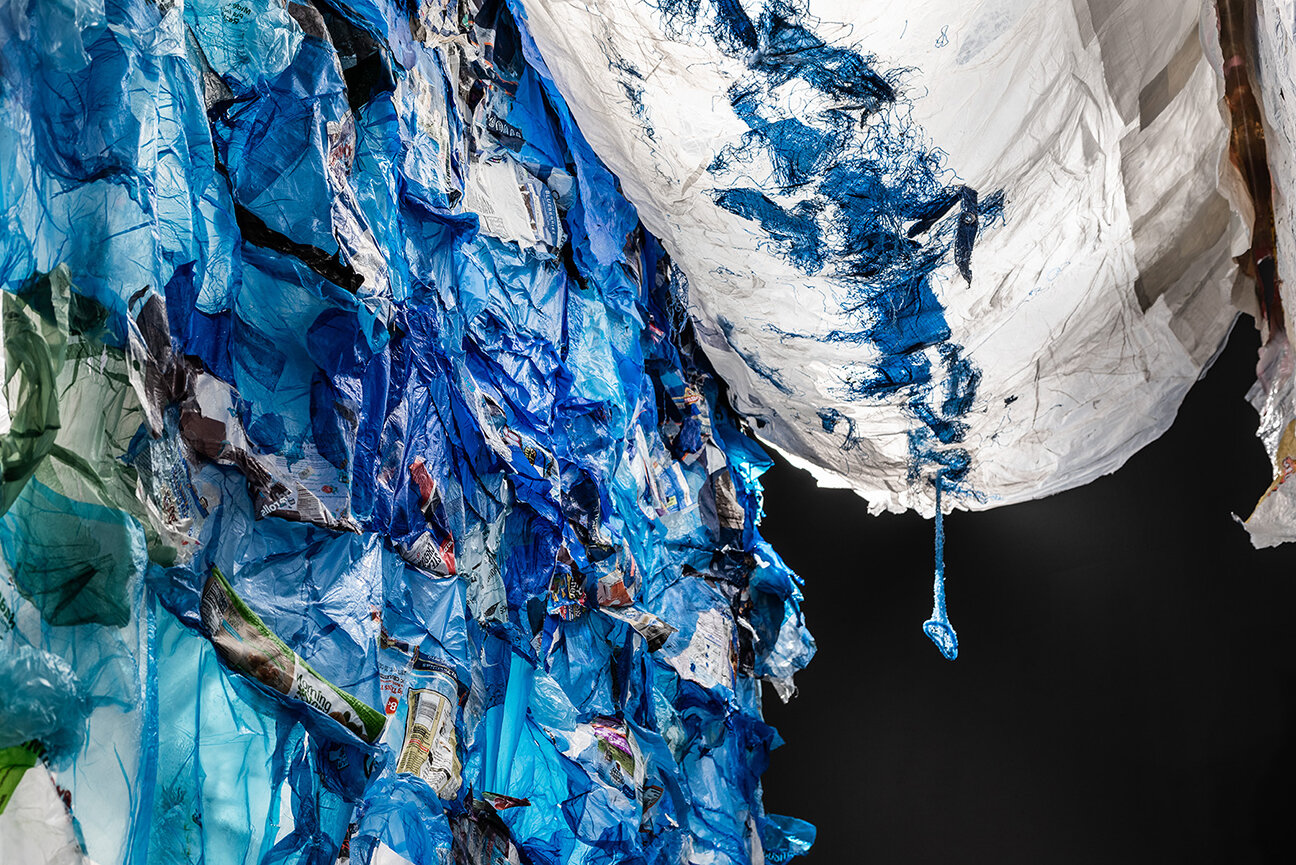
Undercurrent: Plasticene 2019
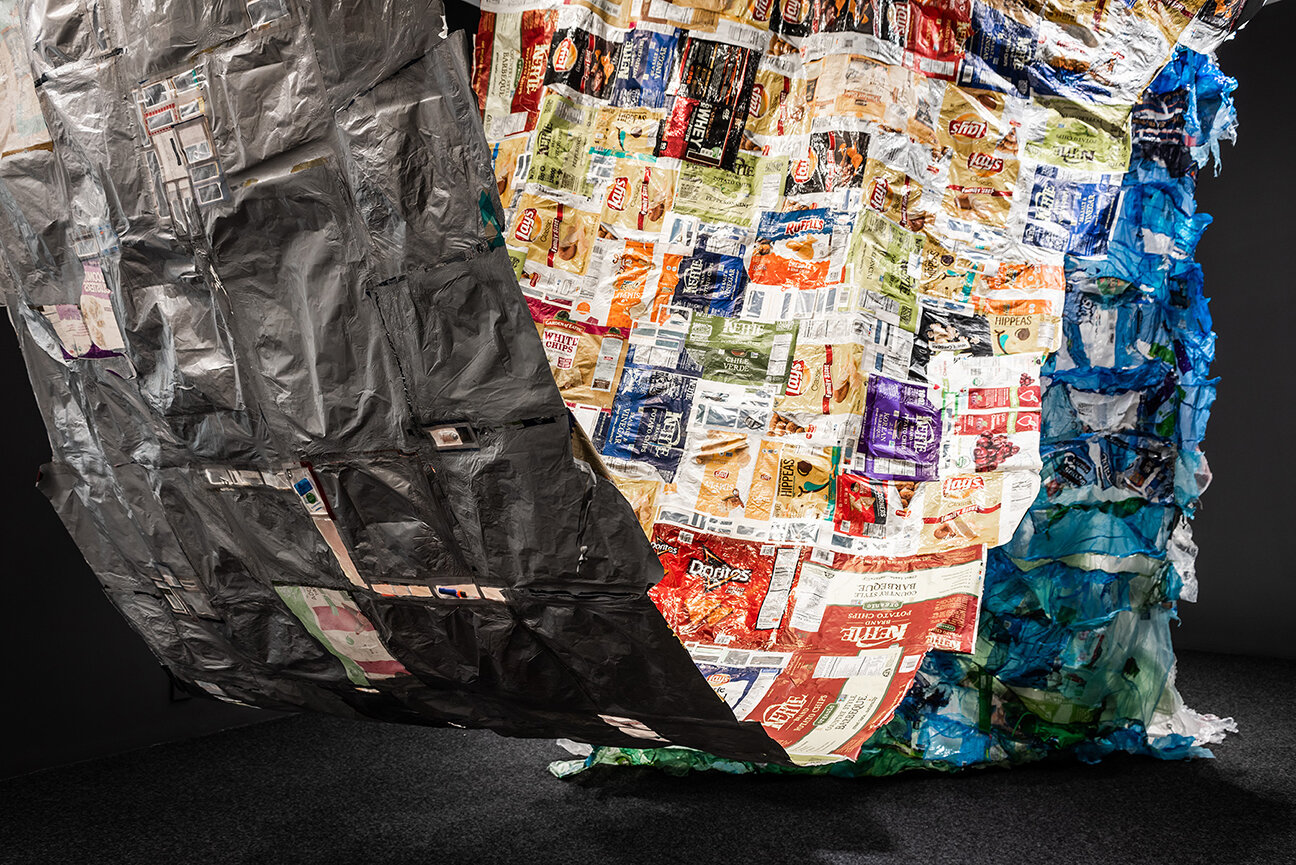
Undercurrent: Plasticene 2019
Chip bags and envelope windows.
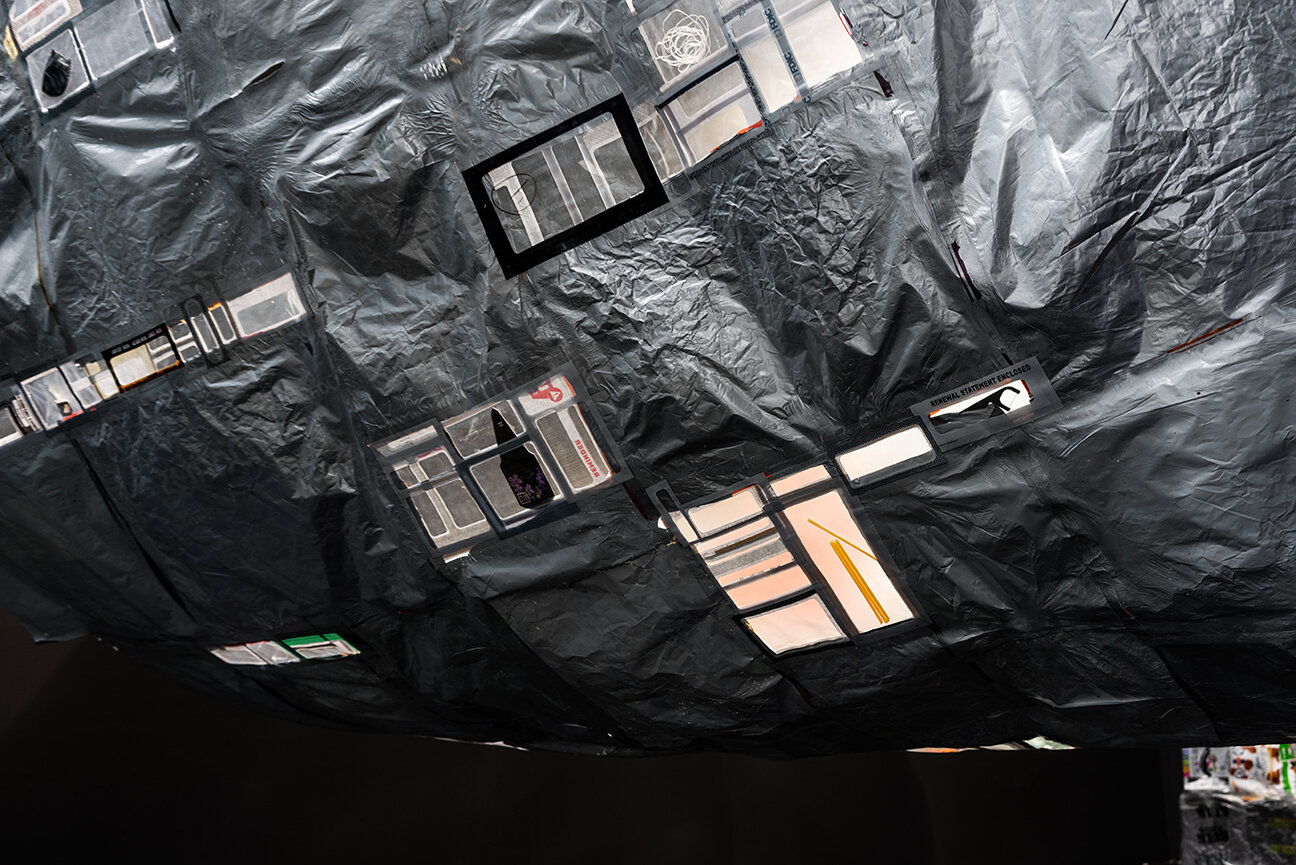
Undercurrent: Plasticene 2019
Envelope windows trapping non-recyclable material: straws, floss/er, painty liner, beauty samples, medicine packaging, etc.
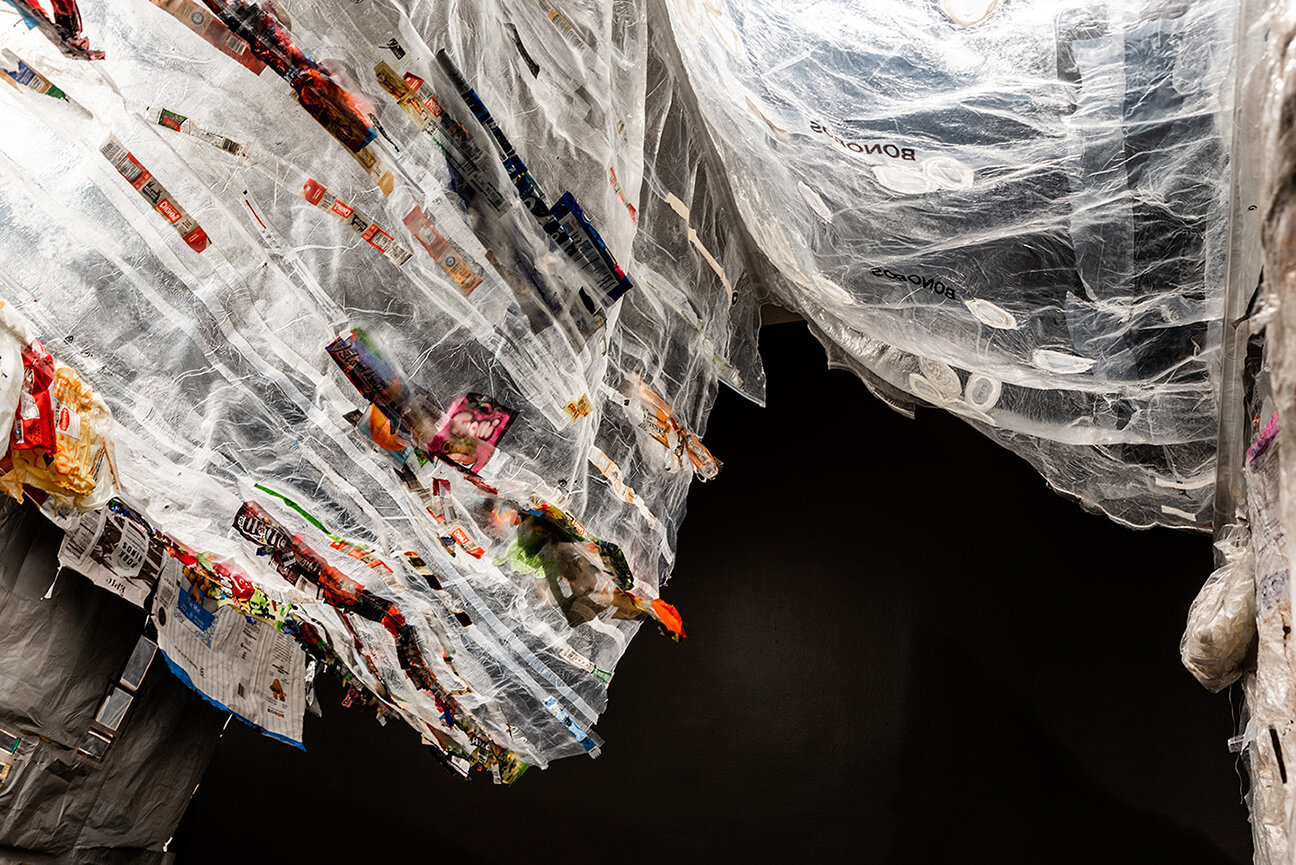
Undercurrent: Plasticene 2019
Candy wrappers, plastic food packaging.
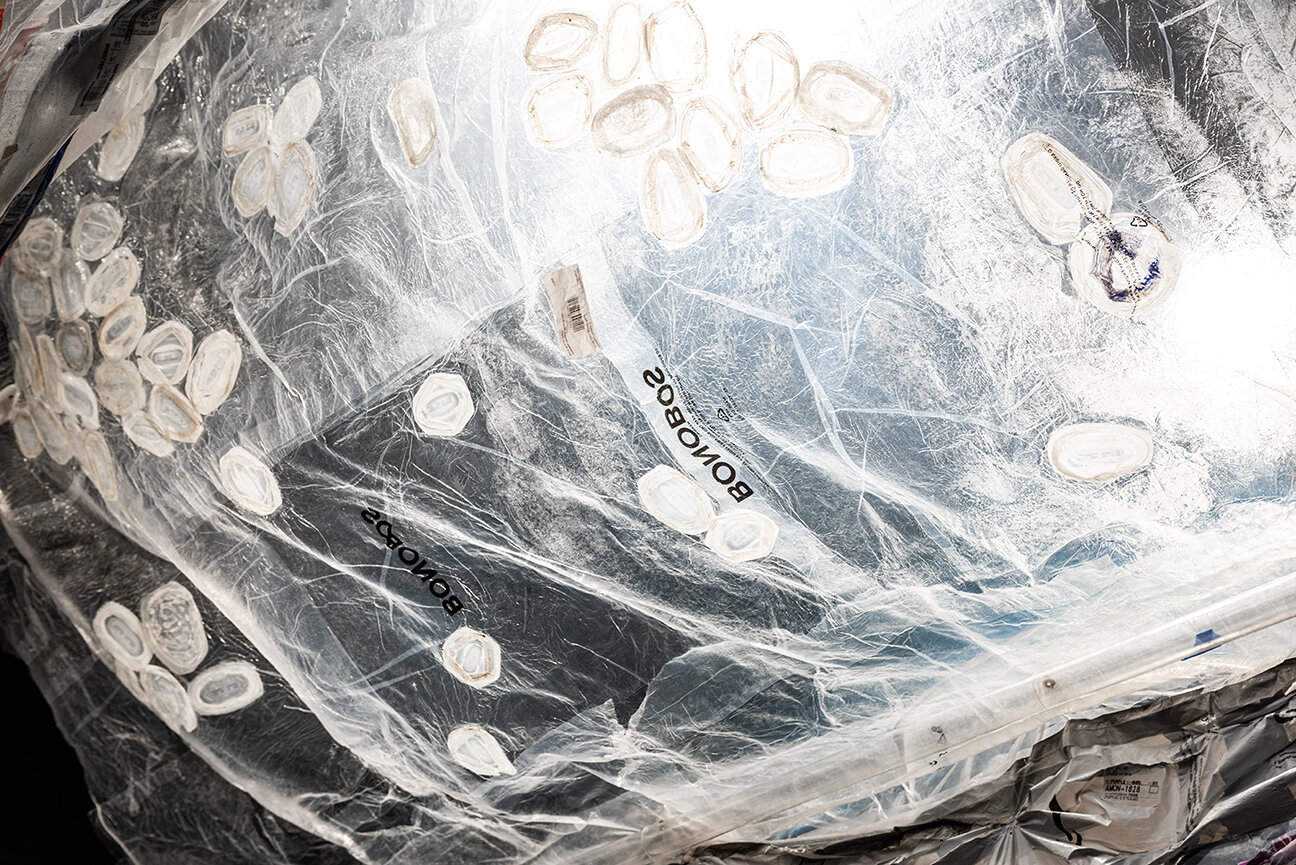
Undercurrent: Plasticene 2019
Dry cleaner bags, packaging, cat food containers.

Undercurrent: Plasticene 2019
Food packaging.
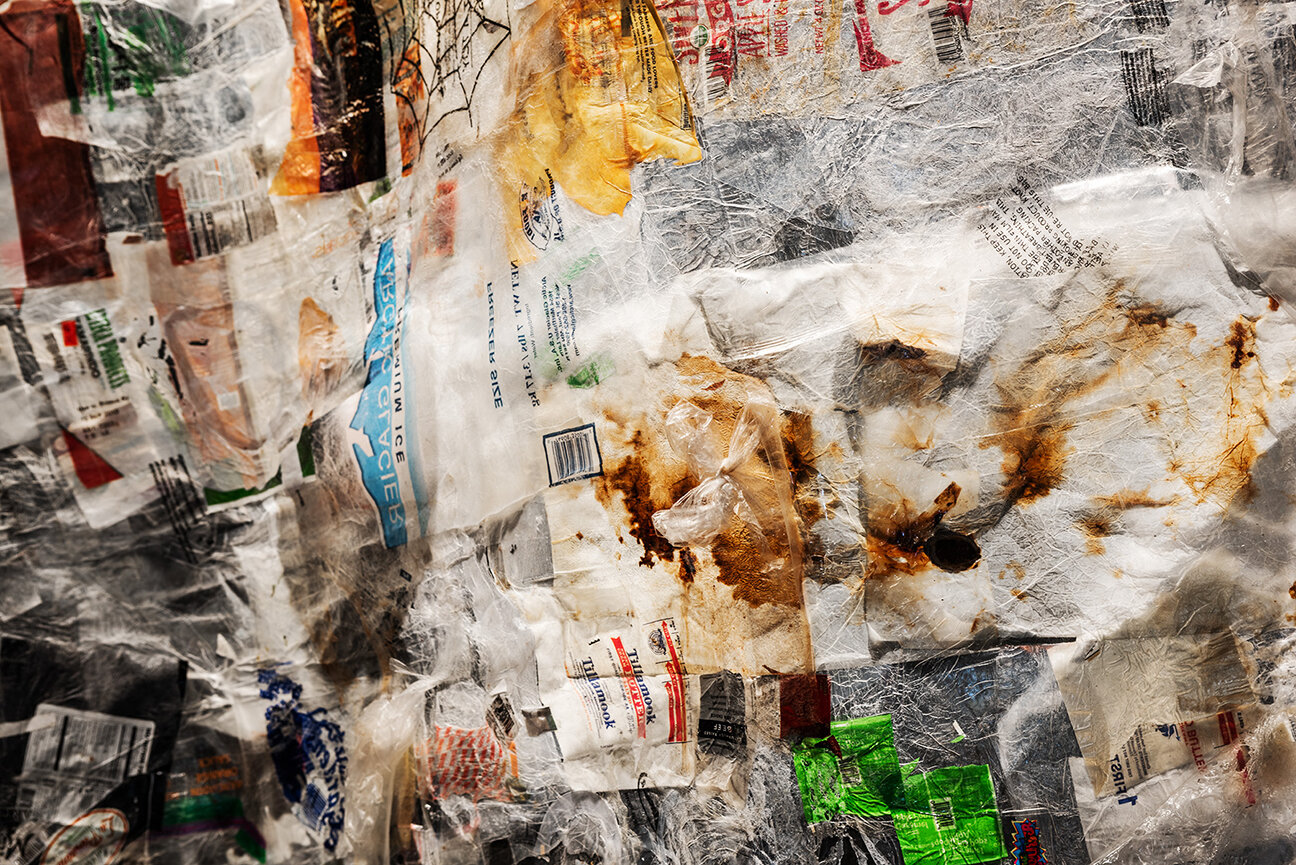
Undercurrent: Plasticene 2019
Detail: food packaging.
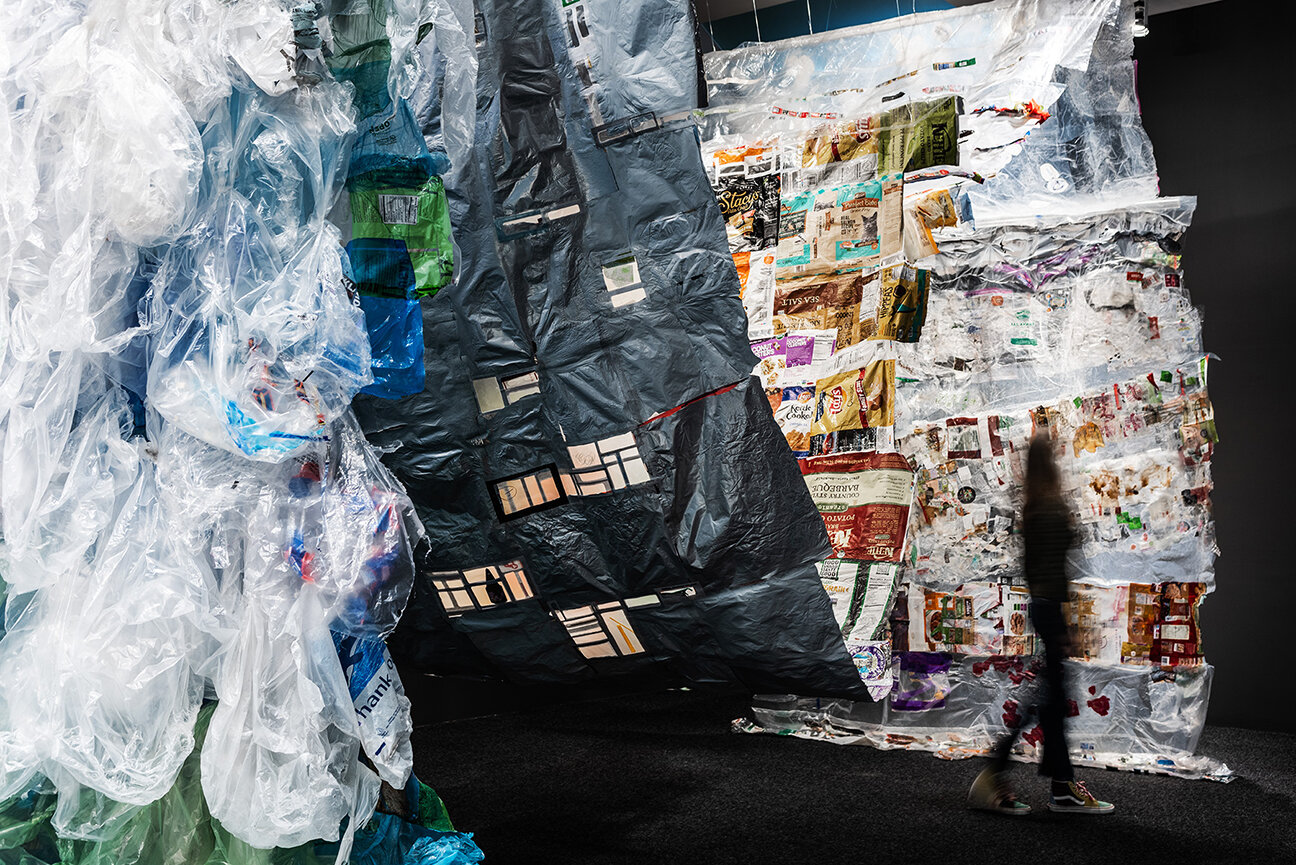
Undercurrent: Plasticene 2019
WORK



























